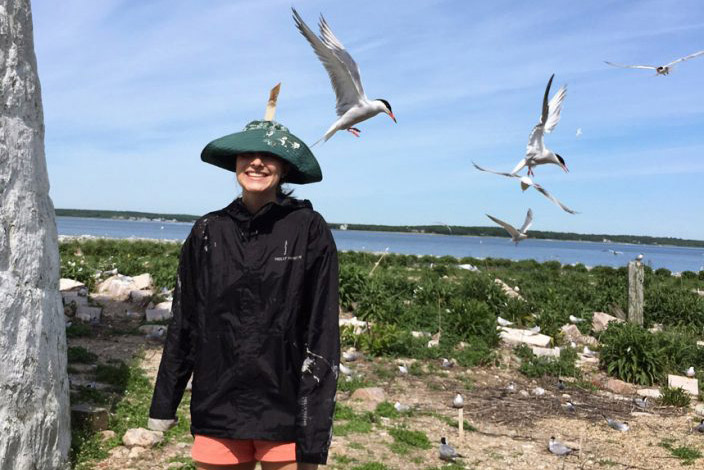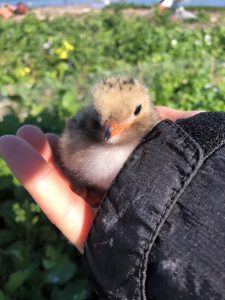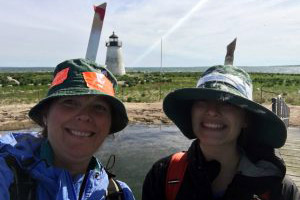- Apply
- Visit
- Request Info
- Give
Rachael Finch Studies Endangered Birds in Buzzards Bay
Written by Michael Rouleau
Published on July 11, 2019

Rachael Finch, a biology major at Eastern Connecticut State University, has spent the past five weeks working with the endangered birds in Massachusetts’ Buzzards Bay. As the recipient of an Eastern Summer Research Fellowship, she is working to help restore the population of roseate terns — an endangered, migratory seabird that nests in the Northeast.
Under the supervision of Biology Professor Patty Szczys and in collaboration with Mass Wildlife, Finch’s field work occurred on Ram and Bird Islands in Buzzards Bay. Each morning, she’d take a boat ride to either of the islands and spend the day monitoring the birds. “Being on the island every day is exhausting,” she said of the early mornings and long hours. “However, the work we’re doing for the birds is crucial to help their survival.”
“Being on the island every day is exhausting,” she said of the early mornings and long hours. “However, the work we’re doing for the birds is crucial to help their survival.”
Among her objectives, Finch is assessing whether leg banding — the traditional method of tracking and monitoring terns — is in fact harming the already endangered birds. “The bands may cause an increase in mortality on their wintering grounds, thus potentially contributing to their slow population growth,” said Finch, who is comparing survival rates in banded versus un-banded terns.
She’s also conducting a pilot study on the effects of PIT tagging — a newer, subtler method of tracking, which involves inserting a very small “passive-integrated transponder” (PIT) under the skin, along the heel of the bird.
The fellowship began in mid-May with Finch and Szczys marking and monitoring nests on the islands. The pilot study commenced in late May, as they safely captured and tagged terns, recorded their behavior, collected blood samples and weighed chicks in their nest.
Finch’s research will continue for semesters to come. In the laboratory she’ll perform data analysis and work with blood samples to extract DNA. “Based on our initial observations, PIT tagging hasn’t had an effect on the behavior of roseate terns,” she said. “If this holds true, that would be great news because Mass Wildlife would no longer need to band the birds, which previous studies suggest cause increased mortality rates.”

Because the effects of PIT tagging seem favorable, Finch and Szczys plan to expand the study to a larger sample size. Next summer they’ll attempt to locate the experimental birds and determine difference in return rates based on the presence or absence of PIT tags.
“As an undergraduate, the opportunity to be a part of a long-term research project that includes both field and lab work is very rare,” said Finch. “This long-term project will allow me to continue to work toward a solution for tagging the engendered roseate tern.”
Finch and Szczys plan to present their research at the Roseate Tern Recovery Meeting this November in Massachusetts as well as the Waterbird Society meeting in Maryland. They also hope to publish their work in an academic journal.
Upon graduating from Eastern, Finch aspires to attend an advanced program in nursing or radiology.


